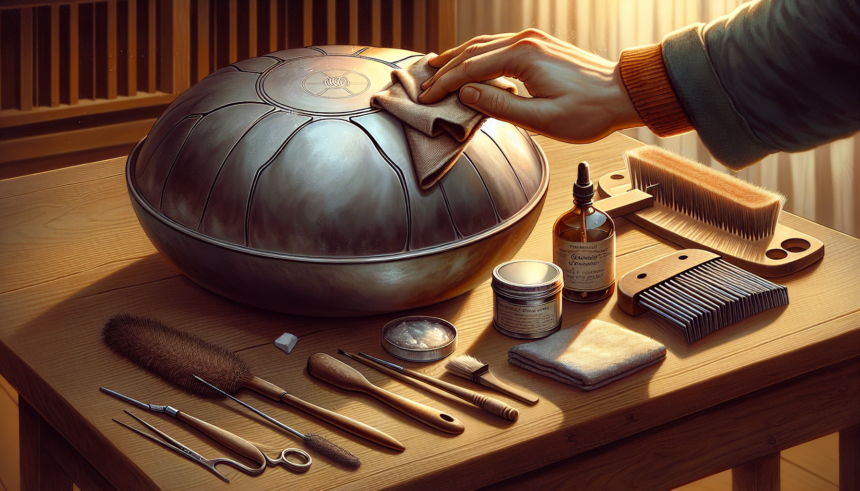<!DOCTYPE html>
<html lang="en">
<head>
<meta charset="UTF-8">
<meta name="viewport" content="width=device-width, initial-scale=1.0">
<title>Handpan Care: Best Practices for Cleaning and Preservation</title>
</head>
<body>
<p>The handpan, with its otherworldly sounds and unique structure, is not just a musical instrument—it's a piece of art. Its ethereal tones can easily transport both player and listener to a place of tranquility. Owning a handpan is both a cherished pleasure and a responsibility. To maintain its harmonics and longevity, proper care is essential. This article delves into the best practices for handpan care, including cleaning, storage, and general preservation techniques.</p>
<h2>Understanding Your Handpan</h2>
<p>Before diving into the specifics of cleaning and preservation, it’s crucial to understand the material composition of your handpan. Most handpans are crafted from nitrided steel, stainless steel, or untreated steel. This composition affects how each handpan reacts to the environment and cleaning methods.</p>
<p>Nitrided steel handpans receive a protective surface treatment to increase hardness and corrosion resistance. Stainless steel offers fantastic corrosion resistance, while untreated steel may be more susceptible to rust if not properly cared for.</p>
<h2>Cleaning Your Handpan</h2>
<h3>1. Regular Maintenance</h3>
<p>Regular maintenance is key in ensuring that your handpan remains in prime condition. Wiping your handpan after each use helps eliminate any oils or sweat from your hands, which can contribute to marking or deterioration.</p>
<ul>
<li><strong>Microfiber Cloth:</strong> Using a soft, dry microfiber cloth, gently wipe down the handpan surface after playing. Avoid any rough or abrasive materials that can scratch the surface.</li>
<li><strong>Damp Cloth:</strong> Occasionally, for a more thorough cleaning, use a slightly damp cloth followed by a dry one to ensure no moisture is left on the surface.</li>
</ul>
<h3>2. Deep Cleaning</h3>
<p>Every few months, or depending on environmental exposure, deep cleaning your handpan can be beneficial.</p>
<ul>
<li><strong>Cleaning Products:</strong> Use a pH-neutral soap mixed with water for cleaning. Avoid any harsh chemicals, as they can damage the finish or alter the sound quality.</li>
<li><strong>Application:</strong> Gently work the soapy mixture onto the handpan’s surface with a microfiber cloth. Rinse with a damp cloth and immediately dry the instrument with a separate cloth.</li>
</ul>
<h2>Polishing and Oil Treatment</h2>
<p>Polishing and oil treatment not only give your handpan a vibrant shine but also offer additional protection against rust and environmental factors.</p>
<h3>1. Choosing the Right Oil</h3>
<p>Use a light, rust-preventive oil such as Ballistol, Frog Lube, or Phoenix Handpan Oil. A little goes a long way, so avoid over-coating.</p>
<h3>2. Application Method</h3>
<ul>
<li><strong>Frequency:</strong> Depending on use, apply oil once every 4-6 weeks or when the handpan appears dull.</li>
<li><strong>Technique:</strong> Apply a small amount of oil onto a soft cloth and gently rub it into the surface. Buff out any excess with a clean cloth until the desired shine is achieved.</li>
</ul>
<h2>Storage and Environmental Factors</h2>
<p>How and where you store your handpan significantly impacts its longevity and sound quality.</p>
<h3>1. Environmental Considerations</h3>
<ul>
<li><strong>Humidity Levels:</strong> Handpans prefer a relatively dry environment. Excessive humidity can accelerate the rusting process, particularly in untreated steel models.</li>
<li><strong>Temperature Fluctuations:</strong> Avoid storing your handpan in areas with severe temperature fluctuations, which can impact tuning. Consistent room temperature is optimal.</li>
</ul>
<h3>2. The Ideal Location</h3>
<ul>
<li><strong>Away from Sunlight:</strong> Direct sunlight can cause discoloration or warming effects that disrupt the handpan’s tuning.</li>
<li><strong>Safe Stand or Carrier:</strong> Use a sturdy stand or protective case when your instrument is not in use. Not only does it safeguard the instrument from accidental knocks, but it also keeps it free from dust.</li>
</ul>
<h2>Avoiding Common Mistakes</h2>
<p>When it comes to handpan care, there are some pitfalls every owner should be aware of:</p>
<ul>
<li><strong>Using Abrasive Materials:</strong> Avoid using steel wool pads or any abrasive cleaning materials which can scratch and damage the handpan's surface.</li>
<li><strong>Over-Oiling:</strong> While oiling is beneficial, over-oiling can lead to an accumulation that attracts dust or dirt. Always ensure excess oil is removed.</li>
<li><strong>Neglecting Regular Care:</strong> Procrastination can lead to corrosion and damage. Establish a routine for cleaning and maintenance.</li>
</ul>
<h2>Conclusion</h2>
<p>Proper handpan care is fundamental to sustaining its unique and enchanting sound. Understanding your instrument’s material and implementing a systematic approach to upkeep, including cleaning, oiling, and thoughtful storage, is invaluable. Avoid common pitfalls by using appropriate materials and methods, and your handpan will not only last a lifetime but continue to offer the ethereal sounds that draw so many to its charm. Preservation is an ongoing commitment, but the reward is an instrument that consistently sings to the soul.</p>
<h2>Frequently Asked Questions (FAQs)</h2>
<h3>1. How often should I clean my handpan?</h3>
<p>A light cleaning with a dry cloth after each use is recommended. A more detailed cleaning with a damp cloth or soap mixture can be done every few months, based on environmental exposure.</p>
<h3>2. Can I use any type of oil on my handpan?</h3>
<p>No, it's essential to use a light, rust-preventive oil such as Ballistol, Frog Lube, or Phoenix Handpan Oil. Avoid using heavy or scented oils as they may leave residue or impact sound quality.</p>
<h3>3. What should I do if my handpan starts to rust?</h3>
<p>If rust appears, gently clean the area with a damp cloth and apply oil. Try to store your handpan in a dryer environment and maintain regular oil treatments.</p>
<h3>4. Is it safe to leave my handpan in the car?</h3>
<p>It's not recommended to leave your handpan in a vehicle. Temperature and humidity fluctuations can affect the tuning and condition of the instrument.</p>
<h3>5. Can I use commercial cleaning products on my handpan?</h3>
<p>Avoid using commercial cleaning products as they may contain chemicals that could harm the handpan's surface or alter sound quality. Stick to a mild soap and water mixture for deep cleaning.</p>
</body>
</html>Handpan Care: Best Practices for Cleaning and Preservation

Leave a comment




